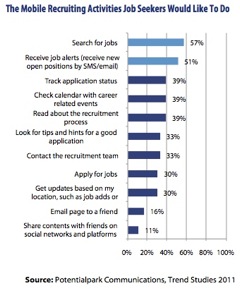If you haven’t invested in mobile recruiting yet, time is running out.
Only 7 percent of corporate career sites are optimized for mobile devices, according to a Potentialpark survey. However, 19 percent of job seekers reported using their mobile device for career activities; 50 percent “could imagine” themselves doing so.
The usage data comes from Potentialpark’s massive annual global survey of students, graduates and early career professionals. It’s Online Talent Communication Study was completed in June and now, with the 2012 survey underway, the recruitment marketing and research firm says the number of mobile job seekers is already showing “a significant rise.”
Job seekers ARE using mobile devices – like it or not
“Job seekers are using their mobile devices for job search whether employers like it or not,” explained Julian Ziesing, a spokeman for Potentialpark. “Much like the employer brand, refusing to create a mobile recruiting strategy doesn’t stop employers from having one. It simply becomes one they don’t control.”
 Internet-accessible mobile devices can connect to most career sites, whether or not they are mobile-optimized. However, if you’ve ever tried to search for a job on a typical corporate career site, you quickly discovered it’s clunky at best and, at worst, some or all of the search features don’t work. Even where you can search, applying for a job from a mobile device may be impossible.
Internet-accessible mobile devices can connect to most career sites, whether or not they are mobile-optimized. However, if you’ve ever tried to search for a job on a typical corporate career site, you quickly discovered it’s clunky at best and, at worst, some or all of the search features don’t work. Even where you can search, applying for a job from a mobile device may be impossible.
That becomes a major hurdle for mobile using job seekers, 30 percent of whom say they want to be able to apply for a job while on the go. More important to the mobile job seekers is the ability to search for jobs (57 percent) and get notified of openings (51 percent).
The latter is one of the few things companies can do almost painlessly. All but the most basic career sites allow users to opt-in for email notifications of jobs matching their interests. Far fewer send text messages. But here’s where a mobile strategy would suggest text over email. Text messages have a read rate approaching 100 percent. The open rate for emails on mobile devices may be no better than 30 percent, though the data is fuzzy.
Is a phone well suited for job hunting?
Says the Potentialpark report:
Having a well implemented mobile recruiting strategy can greatly improve the overall candidate experience – giving the job seeker a convenient and location-independent approach to job search, and (2) not having any mobile recruiting strategy can erode the employer brand and limit the number of quality applicants received overall.”
That said, recruiting consultant and blogger John Sumser has a wholly different and contrarian opinion about mobile recruiting:
Mobile Recruiting is a great way to engineer a flood of ill considered applications that are of lower quality that people are already complaining about? Why? The tool (a phone) is ill suited for the rigors of job hunting. Research is impractical. Cover letters would have to include apologies for the implicit typos.”
